NUR 115 - Health Promotion: Nurse's Role & Ottawa Charter Plan
VerifiedAdded on 2023/06/04
|7
|2371
|227
Essay
AI Summary
This essay explores the critical role of nurses in primary health care, particularly in addressing stress among young people, through the lens of the Ottawa Charter for Health Promotion. It details the five strategic actions outlined in the charter – building healthy public policy, creating supportive environments, strengthening community action, developing personal skills, and reorienting health services – and illustrates how nurses can implement these strategies to mitigate stress and promote mental well-being in the younger generation. The essay emphasizes the importance of collaboration between nurses, parents, teachers, and communities to foster a supportive environment where young people feel empowered to manage stress and lead healthier lives, highlighting the nurse's role as a counselor, educator, and advocate for effective health policies and practices.
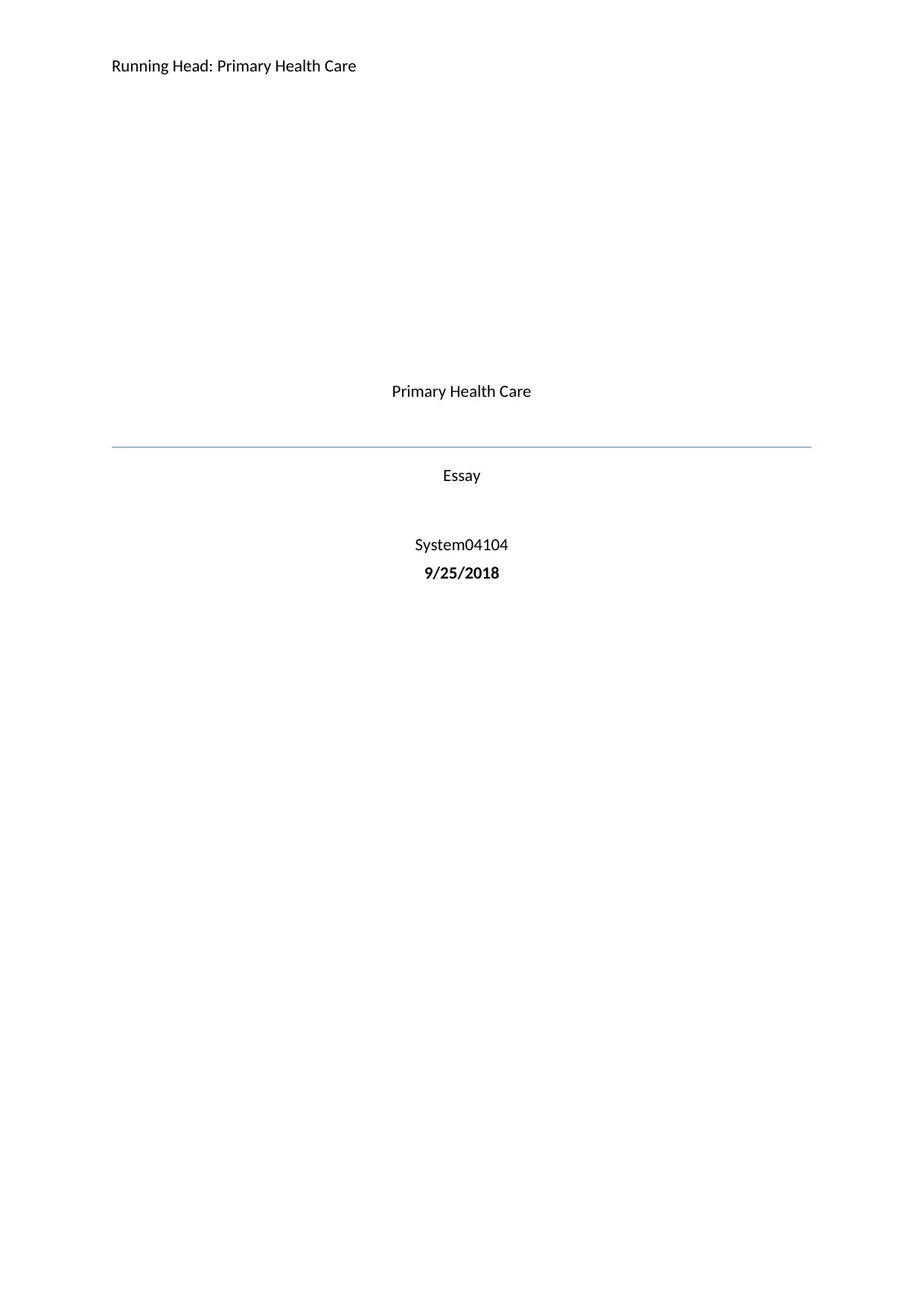
Running Head: Primary Health Care
Primary Health Care
Essay
System04104
9/25/2018
Primary Health Care
Essay
System04104
9/25/2018
Paraphrase This Document
Need a fresh take? Get an instant paraphrase of this document with our AI Paraphraser
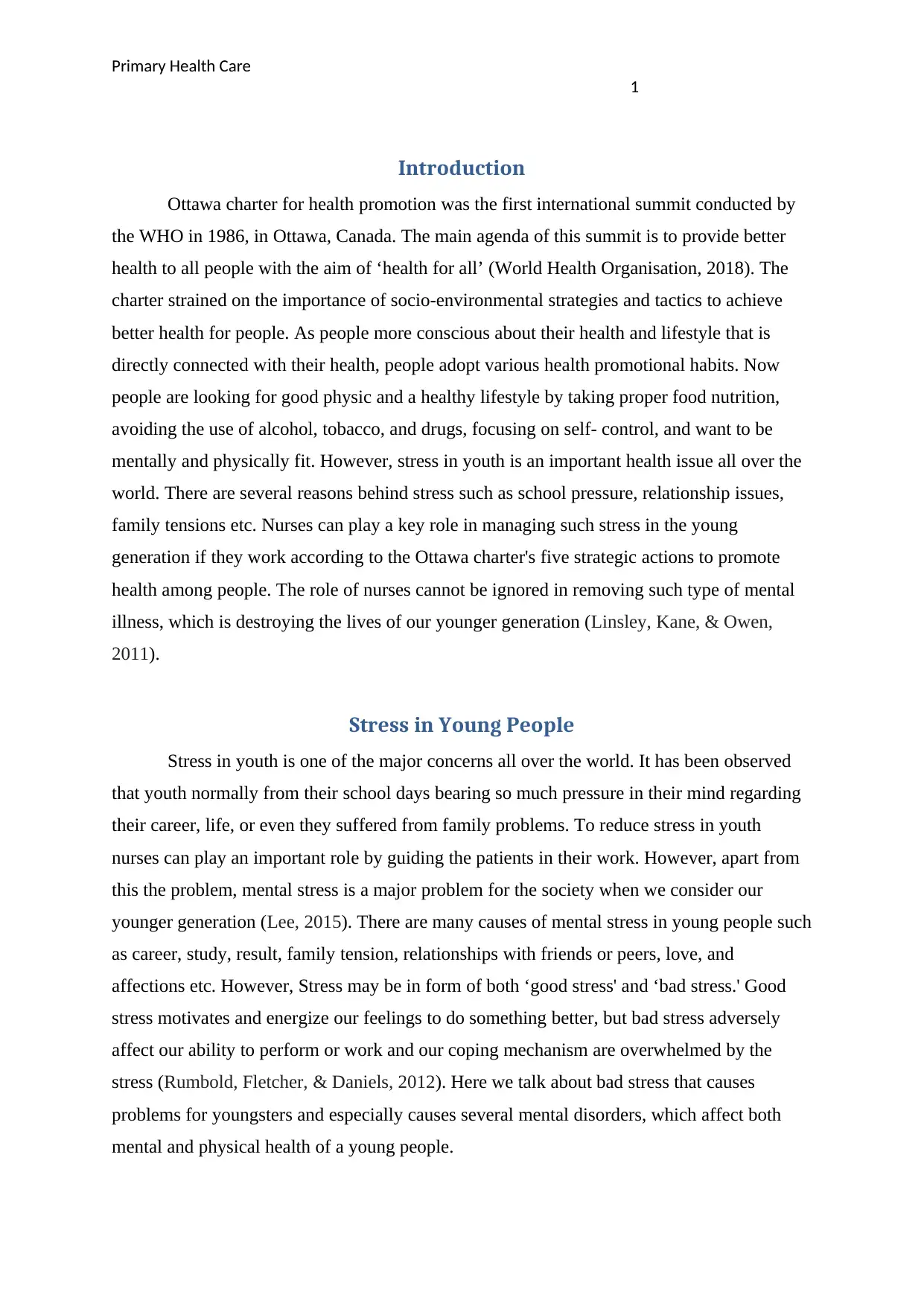
Primary Health Care
1
Introduction
Ottawa charter for health promotion was the first international summit conducted by
the WHO in 1986, in Ottawa, Canada. The main agenda of this summit is to provide better
health to all people with the aim of ‘health for all’ (World Health Organisation, 2018). The
charter strained on the importance of socio-environmental strategies and tactics to achieve
better health for people. As people more conscious about their health and lifestyle that is
directly connected with their health, people adopt various health promotional habits. Now
people are looking for good physic and a healthy lifestyle by taking proper food nutrition,
avoiding the use of alcohol, tobacco, and drugs, focusing on self- control, and want to be
mentally and physically fit. However, stress in youth is an important health issue all over the
world. There are several reasons behind stress such as school pressure, relationship issues,
family tensions etc. Nurses can play a key role in managing such stress in the young
generation if they work according to the Ottawa charter's five strategic actions to promote
health among people. The role of nurses cannot be ignored in removing such type of mental
illness, which is destroying the lives of our younger generation (Linsley, Kane, & Owen,
2011).
Stress in Young People
Stress in youth is one of the major concerns all over the world. It has been observed
that youth normally from their school days bearing so much pressure in their mind regarding
their career, life, or even they suffered from family problems. To reduce stress in youth
nurses can play an important role by guiding the patients in their work. However, apart from
this the problem, mental stress is a major problem for the society when we consider our
younger generation (Lee, 2015). There are many causes of mental stress in young people such
as career, study, result, family tension, relationships with friends or peers, love, and
affections etc. However, Stress may be in form of both ‘good stress' and ‘bad stress.' Good
stress motivates and energize our feelings to do something better, but bad stress adversely
affect our ability to perform or work and our coping mechanism are overwhelmed by the
stress (Rumbold, Fletcher, & Daniels, 2012). Here we talk about bad stress that causes
problems for youngsters and especially causes several mental disorders, which affect both
mental and physical health of a young people.
1
Introduction
Ottawa charter for health promotion was the first international summit conducted by
the WHO in 1986, in Ottawa, Canada. The main agenda of this summit is to provide better
health to all people with the aim of ‘health for all’ (World Health Organisation, 2018). The
charter strained on the importance of socio-environmental strategies and tactics to achieve
better health for people. As people more conscious about their health and lifestyle that is
directly connected with their health, people adopt various health promotional habits. Now
people are looking for good physic and a healthy lifestyle by taking proper food nutrition,
avoiding the use of alcohol, tobacco, and drugs, focusing on self- control, and want to be
mentally and physically fit. However, stress in youth is an important health issue all over the
world. There are several reasons behind stress such as school pressure, relationship issues,
family tensions etc. Nurses can play a key role in managing such stress in the young
generation if they work according to the Ottawa charter's five strategic actions to promote
health among people. The role of nurses cannot be ignored in removing such type of mental
illness, which is destroying the lives of our younger generation (Linsley, Kane, & Owen,
2011).
Stress in Young People
Stress in youth is one of the major concerns all over the world. It has been observed
that youth normally from their school days bearing so much pressure in their mind regarding
their career, life, or even they suffered from family problems. To reduce stress in youth
nurses can play an important role by guiding the patients in their work. However, apart from
this the problem, mental stress is a major problem for the society when we consider our
younger generation (Lee, 2015). There are many causes of mental stress in young people such
as career, study, result, family tension, relationships with friends or peers, love, and
affections etc. However, Stress may be in form of both ‘good stress' and ‘bad stress.' Good
stress motivates and energize our feelings to do something better, but bad stress adversely
affect our ability to perform or work and our coping mechanism are overwhelmed by the
stress (Rumbold, Fletcher, & Daniels, 2012). Here we talk about bad stress that causes
problems for youngsters and especially causes several mental disorders, which affect both
mental and physical health of a young people.
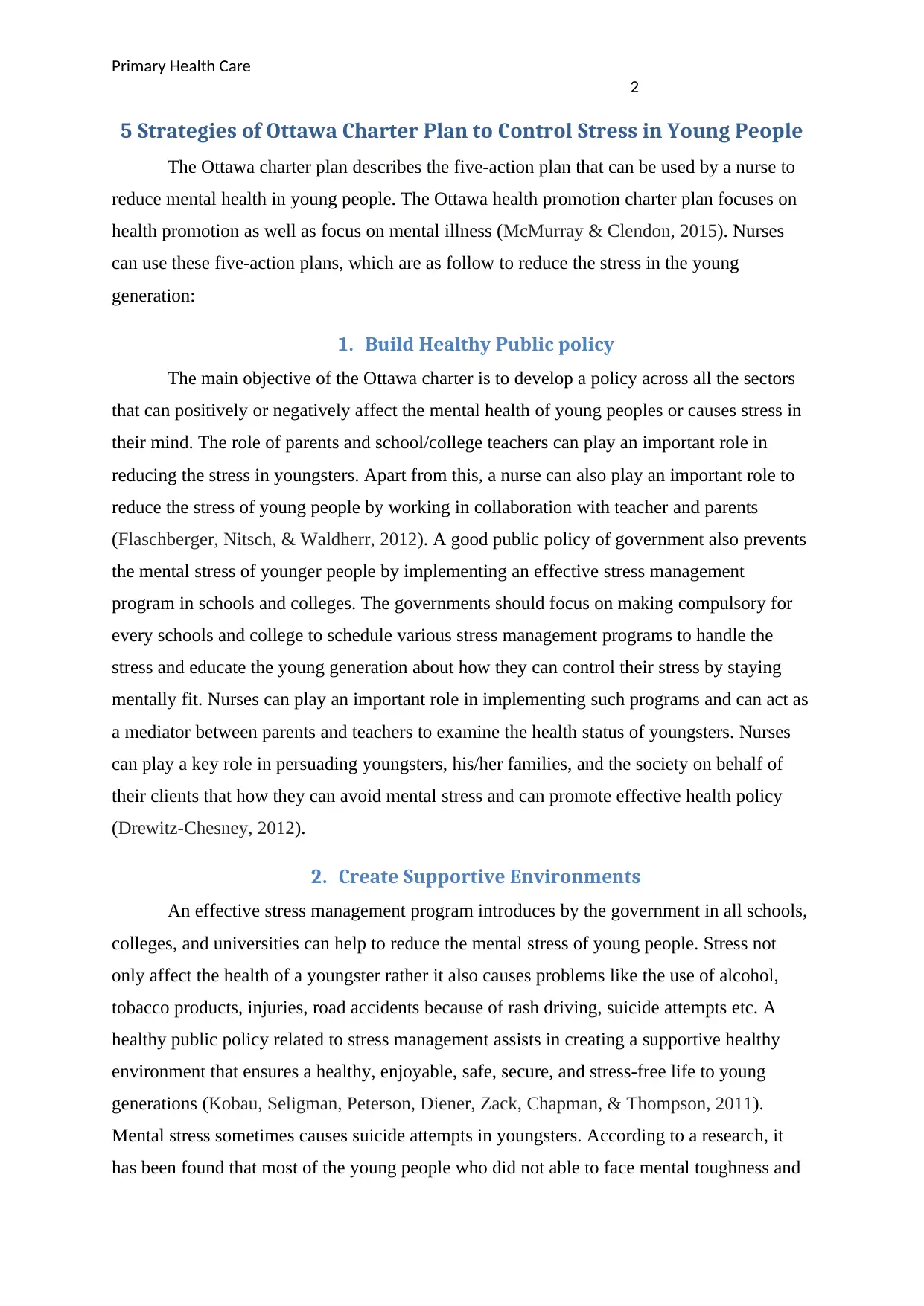
Primary Health Care
2
5 Strategies of Ottawa Charter Plan to Control Stress in Young People
The Ottawa charter plan describes the five-action plan that can be used by a nurse to
reduce mental health in young people. The Ottawa health promotion charter plan focuses on
health promotion as well as focus on mental illness (McMurray & Clendon, 2015). Nurses
can use these five-action plans, which are as follow to reduce the stress in the young
generation:
1. Build Healthy Public policy
The main objective of the Ottawa charter is to develop a policy across all the sectors
that can positively or negatively affect the mental health of young peoples or causes stress in
their mind. The role of parents and school/college teachers can play an important role in
reducing the stress in youngsters. Apart from this, a nurse can also play an important role to
reduce the stress of young people by working in collaboration with teacher and parents
(Flaschberger, Nitsch, & Waldherr, 2012). A good public policy of government also prevents
the mental stress of younger people by implementing an effective stress management
program in schools and colleges. The governments should focus on making compulsory for
every schools and college to schedule various stress management programs to handle the
stress and educate the young generation about how they can control their stress by staying
mentally fit. Nurses can play an important role in implementing such programs and can act as
a mediator between parents and teachers to examine the health status of youngsters. Nurses
can play a key role in persuading youngsters, his/her families, and the society on behalf of
their clients that how they can avoid mental stress and can promote effective health policy
(Drewitz-Chesney, 2012).
2. Create Supportive Environments
An effective stress management program introduces by the government in all schools,
colleges, and universities can help to reduce the mental stress of young people. Stress not
only affect the health of a youngster rather it also causes problems like the use of alcohol,
tobacco products, injuries, road accidents because of rash driving, suicide attempts etc. A
healthy public policy related to stress management assists in creating a supportive healthy
environment that ensures a healthy, enjoyable, safe, secure, and stress-free life to young
generations (Kobau, Seligman, Peterson, Diener, Zack, Chapman, & Thompson, 2011).
Mental stress sometimes causes suicide attempts in youngsters. According to a research, it
has been found that most of the young people who did not able to face mental toughness and
2
5 Strategies of Ottawa Charter Plan to Control Stress in Young People
The Ottawa charter plan describes the five-action plan that can be used by a nurse to
reduce mental health in young people. The Ottawa health promotion charter plan focuses on
health promotion as well as focus on mental illness (McMurray & Clendon, 2015). Nurses
can use these five-action plans, which are as follow to reduce the stress in the young
generation:
1. Build Healthy Public policy
The main objective of the Ottawa charter is to develop a policy across all the sectors
that can positively or negatively affect the mental health of young peoples or causes stress in
their mind. The role of parents and school/college teachers can play an important role in
reducing the stress in youngsters. Apart from this, a nurse can also play an important role to
reduce the stress of young people by working in collaboration with teacher and parents
(Flaschberger, Nitsch, & Waldherr, 2012). A good public policy of government also prevents
the mental stress of younger people by implementing an effective stress management
program in schools and colleges. The governments should focus on making compulsory for
every schools and college to schedule various stress management programs to handle the
stress and educate the young generation about how they can control their stress by staying
mentally fit. Nurses can play an important role in implementing such programs and can act as
a mediator between parents and teachers to examine the health status of youngsters. Nurses
can play a key role in persuading youngsters, his/her families, and the society on behalf of
their clients that how they can avoid mental stress and can promote effective health policy
(Drewitz-Chesney, 2012).
2. Create Supportive Environments
An effective stress management program introduces by the government in all schools,
colleges, and universities can help to reduce the mental stress of young people. Stress not
only affect the health of a youngster rather it also causes problems like the use of alcohol,
tobacco products, injuries, road accidents because of rash driving, suicide attempts etc. A
healthy public policy related to stress management assists in creating a supportive healthy
environment that ensures a healthy, enjoyable, safe, secure, and stress-free life to young
generations (Kobau, Seligman, Peterson, Diener, Zack, Chapman, & Thompson, 2011).
Mental stress sometimes causes suicide attempts in youngsters. According to a research, it
has been found that most of the young people who did not able to face mental toughness and
⊘ This is a preview!⊘
Do you want full access?
Subscribe today to unlock all pages.

Trusted by 1+ million students worldwide
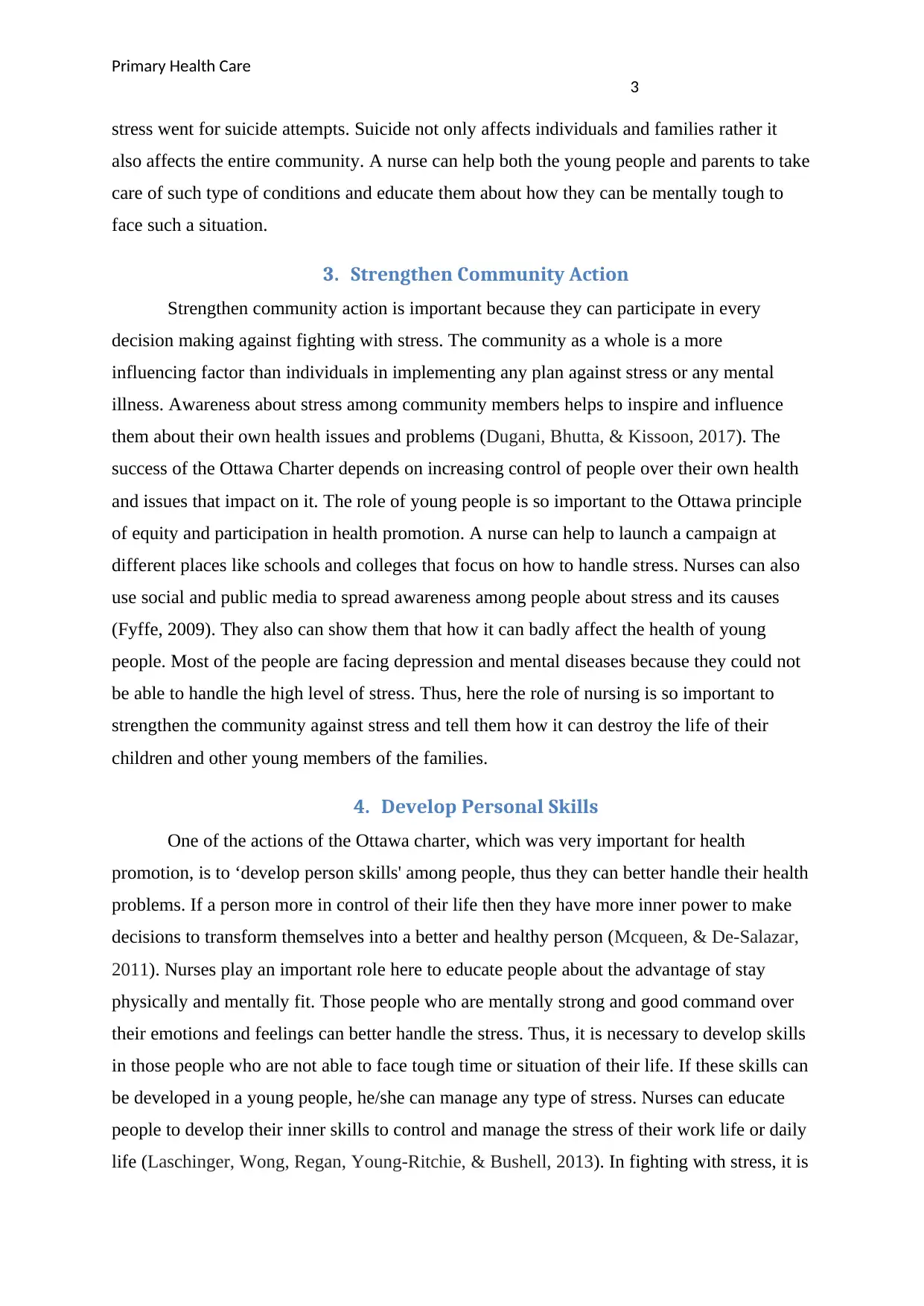
Primary Health Care
3
stress went for suicide attempts. Suicide not only affects individuals and families rather it
also affects the entire community. A nurse can help both the young people and parents to take
care of such type of conditions and educate them about how they can be mentally tough to
face such a situation.
3. Strengthen Community Action
Strengthen community action is important because they can participate in every
decision making against fighting with stress. The community as a whole is a more
influencing factor than individuals in implementing any plan against stress or any mental
illness. Awareness about stress among community members helps to inspire and influence
them about their own health issues and problems (Dugani, Bhutta, & Kissoon, 2017). The
success of the Ottawa Charter depends on increasing control of people over their own health
and issues that impact on it. The role of young people is so important to the Ottawa principle
of equity and participation in health promotion. A nurse can help to launch a campaign at
different places like schools and colleges that focus on how to handle stress. Nurses can also
use social and public media to spread awareness among people about stress and its causes
(Fyffe, 2009). They also can show them that how it can badly affect the health of young
people. Most of the people are facing depression and mental diseases because they could not
be able to handle the high level of stress. Thus, here the role of nursing is so important to
strengthen the community against stress and tell them how it can destroy the life of their
children and other young members of the families.
4. Develop Personal Skills
One of the actions of the Ottawa charter, which was very important for health
promotion, is to ‘develop person skills' among people, thus they can better handle their health
problems. If a person more in control of their life then they have more inner power to make
decisions to transform themselves into a better and healthy person (Mcqueen, & De-Salazar,
2011). Nurses play an important role here to educate people about the advantage of stay
physically and mentally fit. Those people who are mentally strong and good command over
their emotions and feelings can better handle the stress. Thus, it is necessary to develop skills
in those people who are not able to face tough time or situation of their life. If these skills can
be developed in a young people, he/she can manage any type of stress. Nurses can educate
people to develop their inner skills to control and manage the stress of their work life or daily
life (Laschinger, Wong, Regan, Young-Ritchie, & Bushell, 2013). In fighting with stress, it is
3
stress went for suicide attempts. Suicide not only affects individuals and families rather it
also affects the entire community. A nurse can help both the young people and parents to take
care of such type of conditions and educate them about how they can be mentally tough to
face such a situation.
3. Strengthen Community Action
Strengthen community action is important because they can participate in every
decision making against fighting with stress. The community as a whole is a more
influencing factor than individuals in implementing any plan against stress or any mental
illness. Awareness about stress among community members helps to inspire and influence
them about their own health issues and problems (Dugani, Bhutta, & Kissoon, 2017). The
success of the Ottawa Charter depends on increasing control of people over their own health
and issues that impact on it. The role of young people is so important to the Ottawa principle
of equity and participation in health promotion. A nurse can help to launch a campaign at
different places like schools and colleges that focus on how to handle stress. Nurses can also
use social and public media to spread awareness among people about stress and its causes
(Fyffe, 2009). They also can show them that how it can badly affect the health of young
people. Most of the people are facing depression and mental diseases because they could not
be able to handle the high level of stress. Thus, here the role of nursing is so important to
strengthen the community against stress and tell them how it can destroy the life of their
children and other young members of the families.
4. Develop Personal Skills
One of the actions of the Ottawa charter, which was very important for health
promotion, is to ‘develop person skills' among people, thus they can better handle their health
problems. If a person more in control of their life then they have more inner power to make
decisions to transform themselves into a better and healthy person (Mcqueen, & De-Salazar,
2011). Nurses play an important role here to educate people about the advantage of stay
physically and mentally fit. Those people who are mentally strong and good command over
their emotions and feelings can better handle the stress. Thus, it is necessary to develop skills
in those people who are not able to face tough time or situation of their life. If these skills can
be developed in a young people, he/she can manage any type of stress. Nurses can educate
people to develop their inner skills to control and manage the stress of their work life or daily
life (Laschinger, Wong, Regan, Young-Ritchie, & Bushell, 2013). In fighting with stress, it is
Paraphrase This Document
Need a fresh take? Get an instant paraphrase of this document with our AI Paraphraser
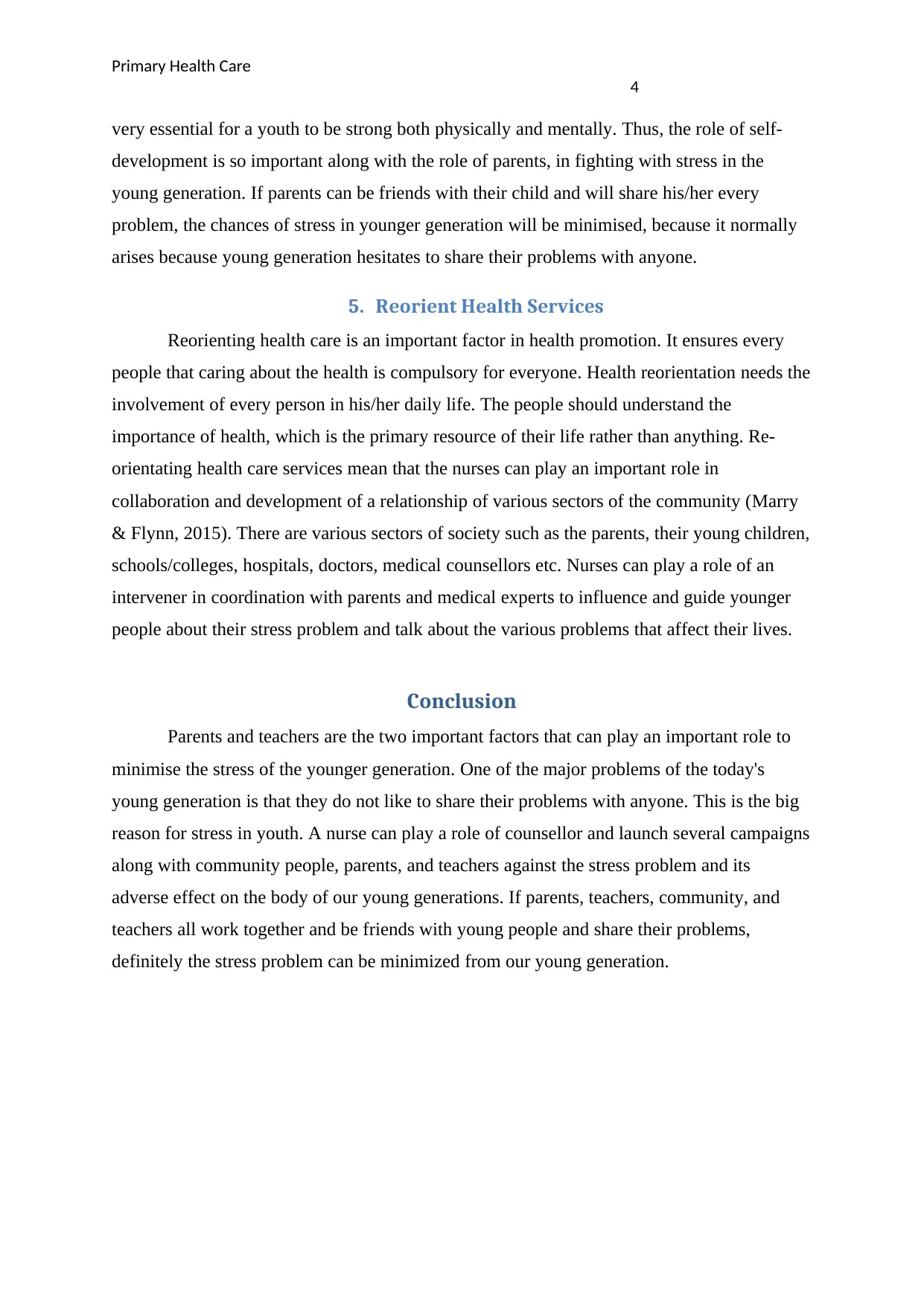
Primary Health Care
4
very essential for a youth to be strong both physically and mentally. Thus, the role of self-
development is so important along with the role of parents, in fighting with stress in the
young generation. If parents can be friends with their child and will share his/her every
problem, the chances of stress in younger generation will be minimised, because it normally
arises because young generation hesitates to share their problems with anyone.
5. Reorient Health Services
Reorienting health care is an important factor in health promotion. It ensures every
people that caring about the health is compulsory for everyone. Health reorientation needs the
involvement of every person in his/her daily life. The people should understand the
importance of health, which is the primary resource of their life rather than anything. Re-
orientating health care services mean that the nurses can play an important role in
collaboration and development of a relationship of various sectors of the community (Marry
& Flynn, 2015). There are various sectors of society such as the parents, their young children,
schools/colleges, hospitals, doctors, medical counsellors etc. Nurses can play a role of an
intervener in coordination with parents and medical experts to influence and guide younger
people about their stress problem and talk about the various problems that affect their lives.
Conclusion
Parents and teachers are the two important factors that can play an important role to
minimise the stress of the younger generation. One of the major problems of the today's
young generation is that they do not like to share their problems with anyone. This is the big
reason for stress in youth. A nurse can play a role of counsellor and launch several campaigns
along with community people, parents, and teachers against the stress problem and its
adverse effect on the body of our young generations. If parents, teachers, community, and
teachers all work together and be friends with young people and share their problems,
definitely the stress problem can be minimized from our young generation.
4
very essential for a youth to be strong both physically and mentally. Thus, the role of self-
development is so important along with the role of parents, in fighting with stress in the
young generation. If parents can be friends with their child and will share his/her every
problem, the chances of stress in younger generation will be minimised, because it normally
arises because young generation hesitates to share their problems with anyone.
5. Reorient Health Services
Reorienting health care is an important factor in health promotion. It ensures every
people that caring about the health is compulsory for everyone. Health reorientation needs the
involvement of every person in his/her daily life. The people should understand the
importance of health, which is the primary resource of their life rather than anything. Re-
orientating health care services mean that the nurses can play an important role in
collaboration and development of a relationship of various sectors of the community (Marry
& Flynn, 2015). There are various sectors of society such as the parents, their young children,
schools/colleges, hospitals, doctors, medical counsellors etc. Nurses can play a role of an
intervener in coordination with parents and medical experts to influence and guide younger
people about their stress problem and talk about the various problems that affect their lives.
Conclusion
Parents and teachers are the two important factors that can play an important role to
minimise the stress of the younger generation. One of the major problems of the today's
young generation is that they do not like to share their problems with anyone. This is the big
reason for stress in youth. A nurse can play a role of counsellor and launch several campaigns
along with community people, parents, and teachers against the stress problem and its
adverse effect on the body of our young generations. If parents, teachers, community, and
teachers all work together and be friends with young people and share their problems,
definitely the stress problem can be minimized from our young generation.
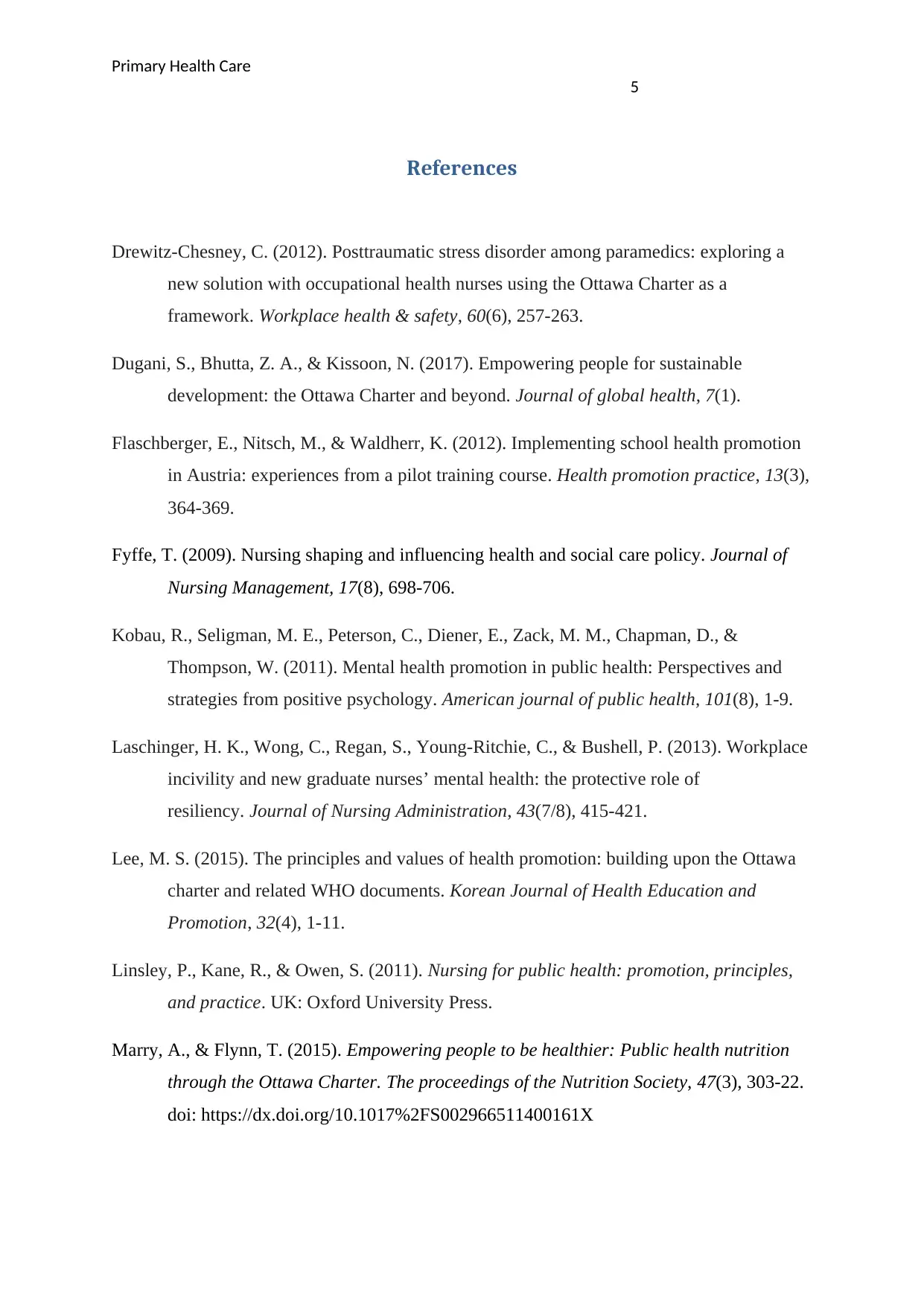
Primary Health Care
5
References
Drewitz-Chesney, C. (2012). Posttraumatic stress disorder among paramedics: exploring a
new solution with occupational health nurses using the Ottawa Charter as a
framework. Workplace health & safety, 60(6), 257-263.
Dugani, S., Bhutta, Z. A., & Kissoon, N. (2017). Empowering people for sustainable
development: the Ottawa Charter and beyond. Journal of global health, 7(1).
Flaschberger, E., Nitsch, M., & Waldherr, K. (2012). Implementing school health promotion
in Austria: experiences from a pilot training course. Health promotion practice, 13(3),
364-369.
Fyffe, T. (2009). Nursing shaping and influencing health and social care policy. Journal of
Nursing Management, 17(8), 698-706.
Kobau, R., Seligman, M. E., Peterson, C., Diener, E., Zack, M. M., Chapman, D., &
Thompson, W. (2011). Mental health promotion in public health: Perspectives and
strategies from positive psychology. American journal of public health, 101(8), 1-9.
Laschinger, H. K., Wong, C., Regan, S., Young-Ritchie, C., & Bushell, P. (2013). Workplace
incivility and new graduate nurses’ mental health: the protective role of
resiliency. Journal of Nursing Administration, 43(7/8), 415-421.
Lee, M. S. (2015). The principles and values of health promotion: building upon the Ottawa
charter and related WHO documents. Korean Journal of Health Education and
Promotion, 32(4), 1-11.
Linsley, P., Kane, R., & Owen, S. (2011). Nursing for public health: promotion, principles,
and practice. UK: Oxford University Press.
Marry, A., & Flynn, T. (2015). Empowering people to be healthier: Public health nutrition
through the Ottawa Charter. The proceedings of the Nutrition Society, 47(3), 303-22.
doi: https://dx.doi.org/10.1017%2FS002966511400161X
5
References
Drewitz-Chesney, C. (2012). Posttraumatic stress disorder among paramedics: exploring a
new solution with occupational health nurses using the Ottawa Charter as a
framework. Workplace health & safety, 60(6), 257-263.
Dugani, S., Bhutta, Z. A., & Kissoon, N. (2017). Empowering people for sustainable
development: the Ottawa Charter and beyond. Journal of global health, 7(1).
Flaschberger, E., Nitsch, M., & Waldherr, K. (2012). Implementing school health promotion
in Austria: experiences from a pilot training course. Health promotion practice, 13(3),
364-369.
Fyffe, T. (2009). Nursing shaping and influencing health and social care policy. Journal of
Nursing Management, 17(8), 698-706.
Kobau, R., Seligman, M. E., Peterson, C., Diener, E., Zack, M. M., Chapman, D., &
Thompson, W. (2011). Mental health promotion in public health: Perspectives and
strategies from positive psychology. American journal of public health, 101(8), 1-9.
Laschinger, H. K., Wong, C., Regan, S., Young-Ritchie, C., & Bushell, P. (2013). Workplace
incivility and new graduate nurses’ mental health: the protective role of
resiliency. Journal of Nursing Administration, 43(7/8), 415-421.
Lee, M. S. (2015). The principles and values of health promotion: building upon the Ottawa
charter and related WHO documents. Korean Journal of Health Education and
Promotion, 32(4), 1-11.
Linsley, P., Kane, R., & Owen, S. (2011). Nursing for public health: promotion, principles,
and practice. UK: Oxford University Press.
Marry, A., & Flynn, T. (2015). Empowering people to be healthier: Public health nutrition
through the Ottawa Charter. The proceedings of the Nutrition Society, 47(3), 303-22.
doi: https://dx.doi.org/10.1017%2FS002966511400161X
⊘ This is a preview!⊘
Do you want full access?
Subscribe today to unlock all pages.

Trusted by 1+ million students worldwide
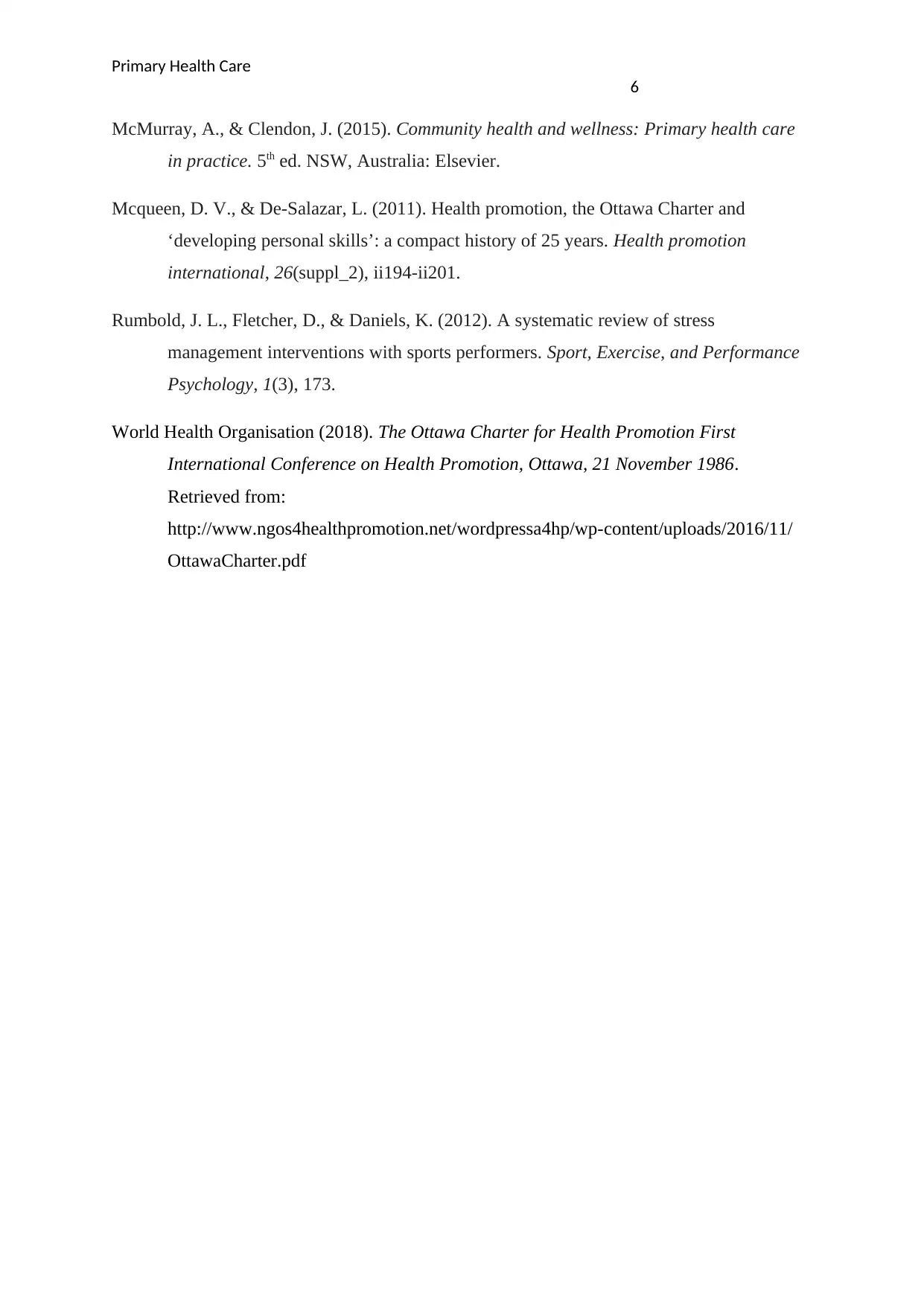
Primary Health Care
6
McMurray, A., & Clendon, J. (2015). Community health and wellness: Primary health care
in practice. 5th ed. NSW, Australia: Elsevier.
Mcqueen, D. V., & De-Salazar, L. (2011). Health promotion, the Ottawa Charter and
‘developing personal skills’: a compact history of 25 years. Health promotion
international, 26(suppl_2), ii194-ii201.
Rumbold, J. L., Fletcher, D., & Daniels, K. (2012). A systematic review of stress
management interventions with sports performers. Sport, Exercise, and Performance
Psychology, 1(3), 173.
World Health Organisation (2018). The Ottawa Charter for Health Promotion First
International Conference on Health Promotion, Ottawa, 21 November 1986.
Retrieved from:
http://www.ngos4healthpromotion.net/wordpressa4hp/wp-content/uploads/2016/11/
OttawaCharter.pdf
6
McMurray, A., & Clendon, J. (2015). Community health and wellness: Primary health care
in practice. 5th ed. NSW, Australia: Elsevier.
Mcqueen, D. V., & De-Salazar, L. (2011). Health promotion, the Ottawa Charter and
‘developing personal skills’: a compact history of 25 years. Health promotion
international, 26(suppl_2), ii194-ii201.
Rumbold, J. L., Fletcher, D., & Daniels, K. (2012). A systematic review of stress
management interventions with sports performers. Sport, Exercise, and Performance
Psychology, 1(3), 173.
World Health Organisation (2018). The Ottawa Charter for Health Promotion First
International Conference on Health Promotion, Ottawa, 21 November 1986.
Retrieved from:
http://www.ngos4healthpromotion.net/wordpressa4hp/wp-content/uploads/2016/11/
OttawaCharter.pdf
1 out of 7
Related Documents
Your All-in-One AI-Powered Toolkit for Academic Success.
+13062052269
info@desklib.com
Available 24*7 on WhatsApp / Email
![[object Object]](/_next/static/media/star-bottom.7253800d.svg)
Unlock your academic potential
Copyright © 2020–2025 A2Z Services. All Rights Reserved. Developed and managed by ZUCOL.




